Prohibiting country songs does not stop prejudice
🌐
Artists, intellectuals, celebrities, sub-celebrities must apologize. To whom for what? No matter: at some point the artist will say something that Twitter watchers will deem offensive to some very sensitive minority, and the intellectual will abuse his white privilege by using a prohibited word that reinforces structural racism, and the influencer will post the photo on Instagram of an adornment that configures colonialist appropriation of oppressed cultures. So the intellectual or artist or celebrity or etc. will publish your mea culpa on social network.
This is more or less what he or she or elx will be forced to say: “I have never condoned prejudice; on the contrary, I have always fought for a more just and egalitarian society, against racism, homo and transphobia; I apologize if I have unwittingly offended someone, and I hope that this experience will serve as a learning curve for me and for us-as-society, as my failure only demonstrates how deeply ingrained or not even invented prejudices we have.”
Such rites of contrition have been repeated for some years now. In 2017, American comedian Bill Maher mocked this trend on his HBO show Real Time (the hilarious monologue can be seen in English, without subtitles, on YouTube). Nor did he escape: in the year of the plague that just ended, Maher apologized for a potentially racist joke he made while interviewing a senator. In Brazil, in 2020, the anthropologist and historian Lilia Moritz Schwarcz apologized for an article in which she said that Beyoncé does not understand modern Africa; the Porta dos Fundos group apologized for making a sketch in which they made jokes about a city councilor from Curitiba; and Felipe Neto – who criticized the machismo of Porta dos Fundos – apologized for participating in a football match in times of social isolation.
 Bill Maher during his HBO show Real Time Photo: Editor / Editor
Bill Maher during his HBO show Real Time Photo: Editor / Editor
I already knew all these penitents before the penance. But I had never heard of country singers Pedro Motta and Henrique. At the end of the year, the duo released the song Lili, which told the story of a man who falls in love with a transvestite, without knowing that she is a transvestite – the discovery only happens on the first night at a motel. Accused of transphobia, Pedro Motta and Henrique changed the lyrics of the song. The unfailing apology took the form of a video in which they presented the new version, on Instagram. Everything seems very calm and friendly, but there is a new fact in this episode that I consider frightening: such a National LGBTI+ Alliance registered a crime-report with the Public Ministry of Goiás, to find out if the duo committed the crime of transphobia.
Understand: singing Lili in the original version would have been a crime.
The STF decided, in 2019, that homophobia and transphobia should be crimes analogous to the already recognized crime of racism. In my limited understanding of legal matters, the decision seems to me to be very correct. Racial or homophobic insults cannot be admitted on Facebook or in football cheering corners, discrimination in the workplace is not accepted, nor that shops, bars, restaurants fail to serve a person because of their ethnicity or sexual orientation. But to consider that a song – good or bad, aesthetic judgment is beside the point here – to be a crime is to ignore the specific nature of artistic representation. This business of taking songs, poems, novels, plays to the dock is typical of totalitarian regimes.
 Luiz Fux, president of the STF Photo: Disclosure
Luiz Fux, president of the STF Photo: Disclosure
In the original version, is Pedro Motta and Henrique’s music transphobic? Perhaps. Sung with a kind of mocking glee, Lili sounds like an old anecdote from a men’s locker room, with coarse lines (“but she didn’t have what a woman has”) reinforcing the stereotypy of the transvestite as a counterfeit woman, who lives to seduce and elude the straight man. But even the beautiful Três Travestis, by Caetano Veloso – a song that, I hope, no one would think of labeling as transphobic – hints at a certain hidden character of its characters, in the lines “Bad actress / Chão, leap and trix, cheating”.
Here’s what Lili is definitely not: an anthem of hate. There is no violence or anger or incitement to any form of brutality in the lyrics. It is a song of heartache, an update from the old “horn pain” to times of fluid sexuality. In the “offensive” version, the character suffered from the disillusionment of deception, but he still loved the deceiver: “O Lili, o Lili / Why did you lie to me? / O Lili, o Lili / The love of my life is a transvestite.” In the corrected version, the character still goes to the motel without knowing he’s dating a trans woman. The difference is that he accepts the discovery with ease, or even with joy.
Roughly, Lili, in both versions, poses, let’s say, a question of sexual etiquette: would the trans person be obliged to say he is trans as soon as he enters into a relationship that promises to be long-term? And on a night of casual sex? Among the big and small lies that people of all genders tell in their love relationships – the photo with years and pounds less on the social network; the band you’ve never heard of but who say they love it because their partner or partner is a fan; the vote for the wrong candidate that the militant crush doesn’t even suspect – how to punctuate, let’s say, gender dissimulation?
There are no rules for this: each relationship, whether it lasts just a few hours or a lifetime, will take its own course. But it is better not to pretend that these questions do not exist, nor to decree that they cannot be the subject of a song, be it a coarse countryman by Pedro Motta and Henrique or a delicate frevo by Caetano Veloso.
Here is the problem of the eternal circuit of virtual lynchings followed by apologies that so mobilizes the progressive bubble: it only serves to reaffirm prohibitions, interdictions and taboos. It does not allow for argument, counter-argument, dissent, disagreement – all those things that guaranteed the vitality of the public sphere. The attacks on Lilia Schwarcz on social media added nothing to Beyoncé’s critical understanding of pop. In the half-dozen reports and articles I read in the press about Lili – almost all in favor of her banning from streaming platforms – I couldn’t find a single one that satisfactorily explained why the song would be considered transphobic (I made this service for you above – you’re welcome , ungrateful).
Racism, homophobia, transphobia will not be fought with this squeamish surveillance of the missteps of YouTube humorists and country singers. The real racists, homophobes and transphobics laugh it all off. They go on praising torture and celebrating death, without embarrassment or compunction.
Check more articles in our categories Captions & Quotes & Luxe et 90s Outfits.
Thanks for visiting we hope our article Column | Prohibiting country songs does not stop prejudice
, don’t forget to share the article on Facebook, pinterest and whatsapp with the hashtag ☑️ #Column #Prohibiting #country #songs #stop #prejudice ☑️!



